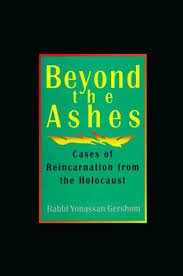 Reviewed by Amy Shapiro, M.Ed.
Reviewed by Amy Shapiro, M.Ed.
In JRT Issue 11, 1993
This book is an anecdotal account of personal stories told to Rabbi Gershom during his work as a spiritual director over a ten year period by hundreds of persons who described to him flashbacks, visions, dreams, and “memories” that appeared to stem from previous lives. What he found particularly interesting was that many of these recollections were made by persons who, in their present life, are not Jewish but were, nonetheless, able to provide detailed information concerning both the holocaust and Eastern European Jewish life and customs—information generally not known in the non-Jewish world.
The author has assembled a collection of these cases and has combined them with some observations and Jewish teachings about such topics as the soul, the concept of afterlife, and Judaic thoughts on reincarnation—subjects about which Rabbi Gershom has studied and taught, and about which he has written extensively.
Rabbi Gershom is a man who truly fathoms the “beyond” and whose life is dedicated to helping others in their quest for similar understanding. There are many good reasons to read this book. Among them are: gaining valuable background information on the multifaceted dimensions of Judaism spanning from ancient to contemporary realities; a unique and spiritually fortified perspective on the specific event of the Holocaust and its continuing ripple effects on our collective and individual psyches; and the gift of faith, that as we move beyond denial or anger toward those evils we must never forget, we can follow a path to forgiveness which heals one’s own soul, thus releasing us from the need to perpetuate any further karmic bondage on that score.
Rabbi Gershom’s candid, self-disclosing style allows the reader to feel the generous warmth of a person on his own continuing journey. Readers of all backgrounds are taken into consideration, as are potential biases toward the subjects of reincarnation, Judaism, and the Holocaust. It is this thoughtfulness that most captivates and engages one in the larger moral questions that inherently beg for attention as we face so ugly a chapter of history, especially in the light of the recent emergence of a movement toward revisionist history which tries to deny the very reality of the Holocaust.
Several compelling case studies flesh out the author’s theories in a way that is familiar to metaphysically oriented readers who are experienced with past-life therapy. For those not so inclined, Beyond the Ashes opens new doors of insight and meaning and may validate otherwise unexplained intuitions, dreams, or anxieties they may carry within themselves pertaining to Nazi atrocities and the injustices that are still suffered as a result.
Beyond the Ashes fills an important literary void, as it builds bridges among secular, religious, political, and metaphysical realms. The seemingly effortless way in which Rabbi Gershom accomplishes so monumental a task pays tribute to his depth of knowledge and the heights of a wisdom that was borne of having transcended the very ashes of which he writes.
A splendidly useful glossary of Jewish terms found in the book guides us through the richness of a language to which few non-Jews are exposed.
